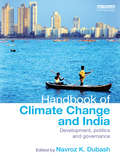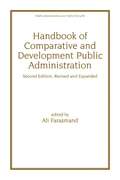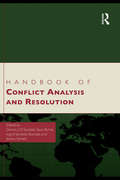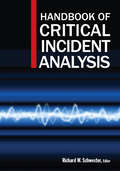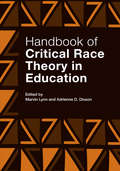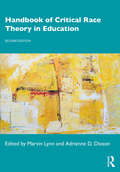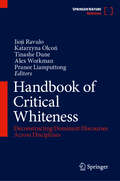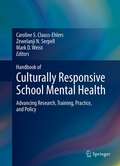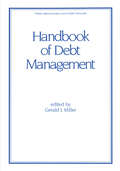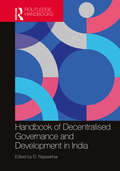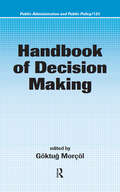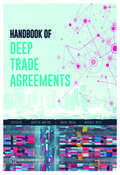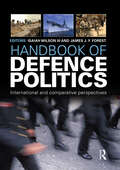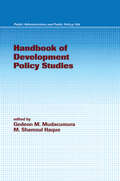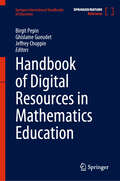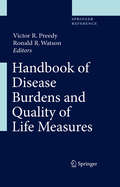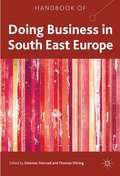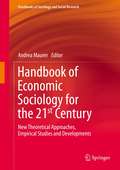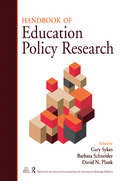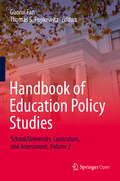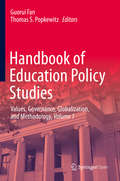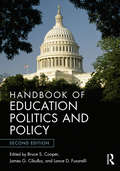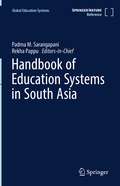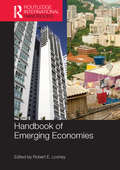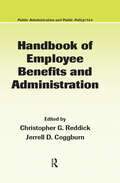- Table View
- List View
Handbook of Climate Change and India: Development, Politics and Governance (Routledge Environment and Sustainability Handbooks)
by Navroz K. DubashHow do policymakers, businesses and civil society in India approach the challenge of climate change? What do they believe global climate negotiations will achieve and how? And how are Indian political and policy debates internalizing climate change? Relatively little is known globally about internal climate debate in emerging industrializing countries, but what happens in rapidly growing economies like India’s will increasingly shape global climate change outcomes. This Handbook brings together prominent voices from India, including policymakers, politicians, business leaders, civil society activists and academics, to build a composite picture of contemporary Indian climate politics and policy. One section lays out the range of positions and substantive issues that shape Indian views on global climate negotiations. Another delves into national politics around climate change. A third looks at how climate change is beginning to be internalized in sectoral policy discussions over energy, urbanization, water, and forests. The volume is introduced by an essay that lays out the critical issues shaping climate politics in India, and its implications for global politics. The papers show that, within India, climate change is approached primarily as a developmental challenge and is marked by efforts to explore how multiple objectives of development, equity and climate mitigation can simultaneously be met. In addition, Indian perspectives on climate negotiations are in a state of flux. Considerations of equity across countries and a focus on the primary responsibility for action of wealthy countries continue to be central, but there are growing voices of concern on the impacts of climate change on India. How domestic debates over climate governance are resolved in the coming years, and the evolution of India’s global negotiation stance are likely to be important inputs toward creating shared understandings across countries in the years ahead, and identify ways forward. This volume on the Indian experience with climate change and development is a valuable contribution to both purposes.
Handbook of Comparative and Development Public Administration (Public Administration and Public Policy)
by Ali FarazmandWith contributions from nearly 80 international experts, this comprehensive resource covers diverse issues, aspects, and features of public administration and policy around the world. It focuses on bureaucracy and bureaucratic politics in developing and industrialized countries and emphasizing administrative performance and policy implementation, as well as political system maintenance and regime enhancement. The book covers the history of public administration and bureaucracy in Persia, Greece, Rome, and Byzantium and among the Aztecs, Incas, and Mayas, public administration in small island states, Eastern Europe, and ethics and other contemporary issues in public administration.
Handbook of Conflict Analysis and Resolution
by Sean Byrne Jessica Senehi Dennis J.D. Sandole Ingrid Sandole-StarosteThis major Handbook comprises cutting-edge essays from leading scholars in the field of Conflict Analysis and Resolution (CAR). The volume provides a comprehensive overview of the core concepts, theories, approaches, processes, and intervention designs in the field. The central theme is the value of multidisciplinary approaches to the analysis and
Handbook of Critical Incident Analysis
by Richard W SchwesterCritical incidents all too often explode onto the social conscious and challenge our sense of security. This comprehensive handbook brings together a range of experts who provide a foundation for the field of critical incident analysis by examining specific incidents9/11, the Virginia Tech massacre, the H1N1 pandemic, the BP oil spill, and more--through various methodological and disciplinary lenses.
Handbook of Critical Race Theory in Education
by Adrienne D. Dixson Marvin LynnThis handbook illustrates how education scholars employ Critical Race Theory (CRT) as a framework to bring attention to issues of race and racism in education. It is the first authoritative reference work to provide a truly comprehensive description and analysis of the topic, from the defining conceptual principles of CRT in the Law that gave shape to its radical underpinnings to the political and social implications of the field today. It is divided into three sections, covering innovations in educational research, policy and practice in both schools and in higher education, and the increasing interdisciplinary nature of critical race research. With 28 newly commissioned pieces written by the most renowned scholars in the field, this handbook provides the definitive statement on the state of critical race theory in education and on its possibilities for the future.
Handbook of Critical Race Theory in Education
by Adrienne D. Dixson Marvin LynnThis handbook illustrates how education scholars employ Critical Race Theory (CRT) as a framework to bring attention to issues of race and racism in education. It is the first authoritative reference work to provide a truly comprehensive description and analysis of the topic, from the defining conceptual principles of CRT in Law that gave shape to its radical underpinnings to the political and social implications of the field today. It is divided into six sections, covering innovations in educational research, policy and practice in both schools and in higher education, and the increasing interdisciplinary nature of critical race research. New chapters broaden the scope of theoretical lenses to include LatCrit, AsianCrit and Critical Race Feminism, as well as coverage of Disability Studies, Research Methods, and other recent updates to the field. This handbook remains the definitive statement on the state of critical race theory in education and on its possibilities for the future.
Handbook of Critical Whiteness: Deconstructing Dominant Discourses Across Disciplines
by Pranee Liamputtong Tinashe Dune Jioji Ravulo Alex Workman Katarzyna OlcońThis timely handbook responds to the international drive to know more about Whiteness – its origins, its impacts and, importantly, the means for diffusing it. Guided by critical Whiteness theory, the volume deconstructs, decodes and disrupts Whiteness as it is constructed and employed in contemporary and diverse contexts. To do so, the international contributors discuss and critique the role of 21st-century Whiteness across a range of professions and disciplines relevant to the needs of contemporary global citizens. Failure to deconstruct Whiteness as an ideology and the power structure underlying national and global racial inequalities undermines the efforts to improve social, health and economic outcomes for societies and nations on a grand scale. The handbook is comprehensive in its nature and contents, with 10 themed parts ranging from a more disciplinary-based approach, theoretical frameworks, and methodological frameworks, to different aspects of decolonized approaches to social, health, political and economic well-being. It navigates how various disciplines respond to the pervasive and persuasive nature of Whiteness in their operational settings, across individual, professional, organisational and systemic levels. The volume is unique in its dual focus on deconstructing Whiteness and providing examples and recommendations on how diverse groups seek to decolonize their communities and people through action. Examples and recommendations are discussed with particular focus on: 1) the interconnection between integrating indigenous and diverse knowledges and perspectives in deconstructing Whiteness; 2) the urgency for critical Whiteness discourse, dialogue and professional development across disciplines; and 3) institutional accountability to decolonisation and anti-racism. Considering the ongoing marginalization and institutional racism directed at non-White individuals and communities and the rise of White supremacy movements, critical Whiteness pedagogy and research is more important than ever. Handbook of Critical Whiteness: Deconstructing Dominant Discourses Across Disciplines is an essential resource for students, educators, academics, researchers, higher education administrators, practitioners, policy-makers, organisational leaders, government stakeholders, and other professionals in social sciences, medicine, STEM, allied/global/public health, legal and political disciplines, and health and social care institutions. It especially engages those interested in decolonisation, critical race theory, critical Whiteness theory, critical multiculturalism, social justice, anti-racism and Indigenous knowledges.
Handbook of Culturally Responsive School Mental Health
by Mark D. Weist Zewelanji N. Serpell Caroline S. Clauss-EhlersSchools across the United States - as well as much of the world - are experiencing widespread change. Students are more diverse ethnically, academically, and emotionally. More attention is being paid to abuse and neglect, violence and bullying, and the growing inequities that contribute to student dropout. Within this changing landscape, cultural competence is imperative for school-based professionals, both ethically and as mandated by educational reform. The Handbook of Culturally Responsive School Mental Health explores the academic and behavioral challenges of an increasingly diverse school environment, offering workable, cost-effective solutions in an accessible, well-organized format. This timely volume updates the research on cultural competence in school-based interventions, describes innovative approaches to counseling and classroom life, and demonstrates how this knowledge is used in successful programs with children, adolescents, and their families. Populations covered range widely, from African American and Asian American/Pacific Islander families to forced migrants and children who live on military bases. By addressing issues of training and policy as well as research and practice, contributors present a variety of topics that are salient, engaging, and applicable to contemporary experience, including: - Adolescent ethnic/racial identity development. - Culturally responsive school mental health in rural communities. - Working with LGBT youth in school settings. - Cultural competence in work with youth gangs. - Culturally integrated substance abuse prevention and sex education programs. - Promoting culturally competent school-based assessment. - School-based behavioral health care in overseas military bases. - Developmental, legal, and linguistic considerations in work with forced migrant children. - Cultural considerations in work/family balance. The Handbook of Culturally Responsive School Mental Health is a must-have reference for researchers, scientist-practitioners, educational policymakers, and graduate students in child and school psychology; educational psychology; pediatrics/school nursing; social work; counseling/therapy; teaching and teacher education; and educational administration.
Handbook of Debt Management (Public Administration And Public Policy Ser. #60)
by Gerald J. MillerExamining various methods of debt management used in the US., Handbook of Debt Management, provides a comprehensive analysis of securities offered for sale by municipalities, states, and the federal government. The book covers laws regarding municipal bonds, the economic choice between debt and taxes and the tax-exempt status of municipal bond owners, capital budgeting, including state and local government practices, developing governmental and intergovernmental debt policies, pay-as-you-go with debt financing for capital projects, US Internal Revenue Service regulations on arbitrage in state and local government debt proceeds investment, US treasury auctions, and more.
Handbook of Decentralised Governance and Development in India
by D. RajasekharThis handbook examines 25 years of decentralised governance and development in India. It provides a historical overview of developments since the introduction of decentralisation reforms (73rd and 74th Constitutional Amendment Acts) and critically assesses the measures initiated to strengthen decentralised institutions and deepen grassroots democracy. It also discusses the status of service delivery and identifies the issues and challenges involved in achieving development at the local level. The volume studies themes such as the devolution of powers in India, administrative and fiscal decentralisation, decentralised planning, Panchayats in scheduled areas, the sociological aspects of decentralisation, caste, gender and local democracy, capacity building, ICT for local governance, urban local governance, workfare and decentralisation, and decentralised natural resource management. It also looks at Panchayati Raj institutions from a Gandhian perspective. The first of its kind, this handbook will be an essential read for scholars and researchers of decentralisation and development, development studies, fiscal decentralisation, political studies, political sociology, Indian politics, Indian government, public policy and governance, political economy, South Asian studies, and South Asian politics.
Handbook of Decision Making (Public Administration and Public Policy)
by Göktuğ ΜοrçölHandbook of Decision Making includes the wisdom of the long theological and philosophical traditions of human society, as well as a systematic exploration of the implications of contemporary evolutionary theories. Common patterns in decision making styles are identified as well as the common variations that different contexts may generate. The text covers the multiplicity of mainstream decision making styles such as cost-benefit analysis, and linear programming. It also explains alternative and emerging methods such as geographic information systems, Q-methodology, and narrative policy analysis. Practical applications are discussed using decision making practices in budgeting, public administration and governance, drug trafficking, and information systems.
Handbook of Deep Trade Agreements
by Aaditya Mattoo, Nadia Rocha, and Michele RutaDeep trade agreements (DTAs) cover not just trade but additional policy areas, such as international flows of investment and labor and the protection of intellectual property rights and the environment. Their goal is integration beyond trade or deep integration. These agreements matter for economic development. Their rules influence how countries (and hence, the people and firms that live and operate within them) transact, invest, work, and ultimately, develop. Trade and investment regimes determine the extent of economic integration, competition rules affect economic efficiency, intellectual property rights matter for innovation, and environmental and labor rules contribute to environmental and social outcomes. This Handbook provides the tools and data needed to analyze these new dimensions of integration and to assess the content and consequences of DTAs. The Handbook and the accompanying database are the result of collaboration between experts in different policy areas from academia and other international organizations, including the International Trade Centre (ITC), Organisation for Economic Co-operation and Development (OECD), United Nations Conference on Trade and Development (UNCTAD), and World Trade Organization (WTO).
Handbook of Defence Politics: International and Comparative Perspectives (Routledge International Handbooks Ser.)
by Isaiah Wilson III James J. F. ForestIssues of defence politics and policy have long been at the forefront of political agendas and defining of international affairs. However, the dramatic changes to the global system that have taken place since the end of the Cold War and parrticularly since the terror attacks on the USA on 11 September 2001 have amplified the world's attention toward political and policy issues of national, regional and global security. The focus of this volume is on examining the fundamental causes of, and defence policy responses to this new 'post-9/11' security environment. Edited by Isaiah (Ike) Wilson III and James J. F. Forest of the US Military Academy, West Point, USA, this volume is international in scope, with pieces written by experts in the field, offering a collection of up-to-date and balanced insights on key contemporary issues of concern to defence policymakers. The book will be an invaluable reference tool for academics and students, researchers in international relations, policymakers, media professionals and government officials.
Handbook of Development Policy Studies (Public Administration and Public Policy)
by Trevor R. HodkinsonConsidering the current challenges to human progress, this reference book examines recent theories, policies, and sectoral priorities, as well as various social, economic, and administrative factors that impact worldwide modernization and development. The book emphasizes the fact that communities must evaluate continuously and adjust their program
Handbook of Digital Resources in Mathematics Education (Springer International Handbooks of Education)
by Ghislaine Gueudet Jeffrey Choppin Birgit PepinThis handbook presents the state-of-the art scholarship on theoretical frames, mathematical content, learning environments, pedagogic practices, teacher professional learning, and policy issues related to the development and use of digital resources in mathematics education. With the advent of more and more open access digital resources, teachers choose from the web what they see fit for their classroom; students choose ‘in the moment’ what they need for their projects and learning paths. However, educators and students often find it difficult to choose from the abundance of materials on offer, as they are uncertain about their quality and beneficial use. It is clear that at a time of bouleversement of the teaching-learning processes, it is crucial to understand the quality and the (potentially) transformative aspects of digital resources. This book provides comprehensive analyses of and insights into the transformative aspects of digital resources.
Handbook of Disease Burdens and Quality of Life Measures
by Victor R. Preedy Ronald R. WatsonThis handbook features in-depth reviews of disability-adjusted life years (DALYs), quality-adjusted life years (QALYs), quality of life and financial measures for over 120 diseases and conditions. Its editors have organized this critical information for maximum access and ease of use, with abstracts, definitions of key terms, summary points, and dozens of figures and tables that can enhance the text or stand alone.
Handbook of Doing Business in South East Europe
by Dietmar Sternad Thomas D�ringA comprehensive insight into a region which is characterized by rapid economic and social changes with a significant rise in foreign direct investments and privatization. Analysis covers political, legal, economic and social trends,and topics such as the influence of informal networks and corruption, as well as cultural diversity.
Handbook of Economic Sociology for the 21st Century: New Theoretical Approaches, Empirical Studies and Developments (Handbooks of Sociology and Social Research)
by Andrea MaurerThis handbook provides an overview on major developments that occurred in the field of economic sociology after its rebirth since the 1980s in the US. It offers new insights on the uniqueness of European economic sociology compared to US economic sociology which emerged at the end of the 20th century. The handbook presents economic sociology as a developing field which started with certain foundations as new economic sociology, widening the perspective by introducing social factors thereby focusing more on general belief systems, social forms of coordination and the relationships between society and the economy. It offers an outstanding portrait of the research field helping to identify major foundations and trajectories as well as new research perspectives for a globalized economic sociology. This makes the handbook appeal to specialized researchers of the field, researchers from other disciplines interested in economic phenomena, as well as graduate and postgraduate students.
Handbook of Education Policy Research
by Barbara Schneider Gary Sykes David N. Plank Timothy G. FordCo-published by Routledge for the American Educational Research Association (AERA) Educational policy continues to be of major concern. Policy debates about economic growth and national competitiveness, for example, commonly focus on the importance of human capital and a highly educated workforce. Defining the theoretical boundaries and methodological approaches of education policy research are the two primary themes of this comprehensive, AERA-sponsored Handbook. Organized into seven sections, the Handbook focuses on (1) disciplinary foundations of educational policy, (2) methodological perspectives, (3) the policy process, (4) resources, management, and organization, (5) teaching and learning policy, (6) actors and institutions, and (7) education access and differentiation. Drawing from multiple disciplines, the Handbook’s over one hundred authors address three central questions: What policy issues and questions have oriented current policy research? What research strategies and methods have proven most fruitful? And what issues, questions, and methods will drive future policy research? Topics such as early childhood education, school choice, access to higher education, teacher accountability, and testing and measurement cut across the 63 chapters in the volume. The politics surrounding these and other issues are objectively analyzed by authors and commentators. Each of the seven sections concludes with two commentaries by leading scholars in the field. The first considers the current state of policy design, and the second addresses the current state of policy research. This book is appropriate for scholars and graduate students working in the field of education policy and for the growing number of academic, government, and think-tank researchers engaged in policy research. For more information on the American Educational Research Association, please visit: http://www.aera.net/.
Handbook of Education Policy Studies: School/University, Curriculum, and Assessment, Volume 2
by Thomas S. Popkewitz Guorui FanThis open access handbook brings together the latest research from a wide range of internationally influential scholars to analyze educational policy research from international, historical and interdisciplinary perspectives. By effectively breaking through the boundaries between countries and disciplines, it presents new theories, techniques and methods for contemporary education policy, and illustrates the educational policies and educational reform practices that various countries have introduced to meet the challenges of continuous change.This volume focuses on policies and changes in schools and classrooms. The studies on school changes present the differences in the policies and challenges of K-12 schools and universities in different countries and regions, and in connection with the contradictions and conflicts between tradition and modernization, as well as the changing roles of various stakeholders, especially that of teachers. In terms of curriculum and instruction, many countries have undertaken experiments and introduced changes based on two major themes: “what to teach” and “how to teach”. International education assessments represented by PISA not only promote the improvement and extensive application of educational assessment and testing techniques, but have also had far-reaching impacts on education policies and education reforms in many countries.Focusing on the changes in educational policies at the micro level, this volume comprehensively reveals the complex interactions between school organizations, teachers, curricula, teaching and learning, evaluation and other elements within the education system, as well as the latest related reforms worldwide.
Handbook of Education Policy Studies: Values, Governance, Globalization, and Methodology, Volume 1
by Thomas S. Popkewitz Guorui FanThis open access handbook brings together the latest research from a wide range of internationally influential scholars to analyze educational policy research from international, historical and interdisciplinary perspectives. By effectively breaking through the boundaries between countries and disciplines, it presents new theories, techniques and methods for contemporary education policy, and illustrates the educational policies and educational reform practices that various countries have introduced to meet the challenges of continuous change.Based on an analysis of the nature of education policy and education reform, this volume focuses on education reform and the concept of education quality. Adopting a historical and comparative perspective, it examines the dialectical relationship between education policy and education reform in various countries, assesses theoretical and practical issues in the process of moving from regulation to multiple governance in contemporary education administration, and explores the impact of globalization on national education reform and the interdependence between countries. In addition, it presents studies addressing educational policy research methodology from multiple perspectives.Highlighting the changes in national education macro policies, this volume comprehensively reveals the complex relationship between contemporary education reform and social change, and explores the links between contemporary social, political and economic systems and educational policy research and practice, offering a holistic portrait of macro trends in contemporary education reform.
Handbook of Education Politics and Policy
by Bruce S. Cooper James G. Cibulka Lance D. FusarelliThis revised edition of the Handbook of Education Politics and Policy presents the latest research and theory on the most important topics within the field of the politics of education. Well-known scholars in the fields of school leadership, politics, policy, law, finance, and educational reform examine the institutional backdrop to our educational system, the political behaviors and cultural influences operating within schools, and the ideological and philosophical positions that frame discussions of educational equity and reform. In its second edition, this comprehensive handbook has been updated to capture recent developments in the politics of education, including Race to the Top and the Common Core State Standards, and to address the changing role politics play in shaping and influencing school policy and reform. Detailed discussions of key topics touch upon important themes in educational politics, helping leaders understand issues of innovation, teacher evaluation, tensions between state and federal lawmakers over new reforms and testing, and how to increase student achievement. Chapter authors also provide suggestions for improving the political behaviors of key educational groups and individuals with the hope that an understanding of political goals, governance processes, and policy outcomes may contribute to ongoing school reform.
Handbook of Education Systems in South Asia (Global Education Systems)
by Padma M. Sarangapani Rekha PappuThis handbook is an important reference work in understanding education systems in the South Asia region, their development trajectory, challenges and potential. The handbook includes the SAARC (South Asian Association for Regional Cooperation) countries for discussion---Afghanistan, Pakistan, India, Nepal, Bhutan, Bangladesh, and Sri Lanka---while also considering countries such as Myanmar and the Maldives that have considerable shared history in the region. Such a comparative perspective is largely absent within the literature given the present paucity of intra-regional interaction. South Asian education systems are viewed primarily through a development lens in terms of inequalities, challenges and responses. However, the development of modern institutions of education and the challenges that it faces requires cultural and historical understanding of indigenous traditions as well as indigenous modern thinkers and education movements. Therefore, this encompassing reference work covers indigenous education traditions, formal education systems, including school and preschool education, higher and professional education, education financing systems and structures, teacher education systems, addressing huge linguistic and other diversities, and marginalization within the formal education system, and pedagogy and curricula. All the countries in this region have their own unique geographical, cultural, economic and political character and histories of interest and significance, and have responded to common issues such as overcoming the colonial legacy, language diversity, or girls’ education, or minority rights in education, in uniquely different ways. The sections therefore include country-specific perspectives as far as possible to highlight these issues. Internationally renowned specialists of South Asian education systems have contributed to this important reference work, making it an invaluable resource for researchers and students of education interested in South Asia.
Handbook of Emerging Economies (Routledge International Handbooks Ser.)
by Robert E. LooneyA major new volume in the Routledge International Handbooks series analysing emerging and newly emerged economies, including the BRICS countries (Brazil, Russia, India, China and South Africa) and other likely (Turkey, Indonesia, Mexico, and South Korea) as well as possible (Vietnam, The Philippines, Nigeria, Pakistan, Egypt, Colombia and Argentina) candidates for emerging economy status. Chapters on theories surrounding emerging markets (including the Beijing/Washington Consensus debate) offer an overview of current issues in development economics, in addition to providing an integrated framework for the country case studies. Written by experts, this handbook will be invaluable to academics and students of economics and emerging economies, as well as to business people and researchers seeking information on economic development and the accelerating pace of globalization.
Handbook of Employee Benefits and Administration (Public Administration and Public Policy)
by Christopher G. Reddick Jerrell D. CoggburnFiscal realities and changing social priorities are requiring a dramatic shift in the way that benefits are selected and awarded to employees, especially in the public sector. This means that public administrators and policy researchers must consider new parameters and contingencies, both financial and social, when evaluating choices and making pol
